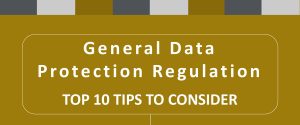Businesses based in Ireland who provide electronically supplied services (e-services) to customers need to understand how to apply VAT correctly, explains Siobhán O’Hea, Partner of Tax Services.
Value Added Tax can be a complicated area for businesses who provide electronically supplied services to customers in the EU or elsewhere.
While the rules may appear daunting, it is important to familiarise yourself with the basics as getting it wrong can be costly.
What are e-services?
The first step in getting to grips with VAT is understanding what is considered an ‘electronically supplied service’ for VAT purposes.
Electronically supplied services, sometimes called ‘e-services’, cover a broad range of services delivered over the Internet or an electronic network. Examples include electronically supplied software and software updates, web hosting, online publications and e-books, the provision of online advertising on websites, music downloads, online games, distance learning programmes which are delivered wholly online without human intervention, and so on.
What these services have in common is that they could not be provided in the absence of information technology.
Tangible products, such CDs and DVDs or printed matter such as books, newspapers and journals, are not e-services even though they may be purchased online.
It is beyond the scope of this article to list everything that is, or is not, considered an e-service, however detailed listings can be found on Revenue website.
If you are in any doubt, it is advisable to seek advice from an experienced tax practitioner familiar with VAT as there is a risk that if you make an error on a sale, you will repeat it on subsequent sales. Errors that go unnoticed for a period of time can be very expensive in the long run.
Place of supply and your customer
Once you have determined whether or not your services are ‘e-services’ for the purposes of VAT, the next step is to look at the ‘place of supply’. This is because ‘place of supply’ rules determine whether a supply is subject to VAT.
If your customer is a business, the place of supply is the place where the business receiving the services is established. Businesses based in Ireland do not normally charge Irish VAT on services to a business established in other EU member states. Instead, the business customer must self-account for VAT in their own country.
If your customer is non-business (a consumer) based in the EU, the place of supply for e-services is the place where the consumer resides. This means that businesses based in Ireland who provide electronically supplied services to consumers in other EU member states are liable to register and account for VAT in each EU member state where they have customers. Revenue provides an optional mini one-stop-shop (MOSS) scheme which aims to reduce the administrative burden and cost of complying with this requirement.
Countries outside the EU
If your business is based in Ireland and you provide e-services to a business or consumer based outside the EU, no EU VAT is charged. However, if the service supplied is effectively used and enjoyed in an EU country, that country can decide to levy VAT.
E-services, provided by suppliers established in a non-EU country to consumers in the EU, must also be taxed at the place where the customer resides or has a permanent address unless the supplier has opted to use the mini one-stop-shop (MOSS) scheme. The non-Union MOSS scheme enables these suppliers to register for VAT in one EU country only.
Complying with EU VAT law
VAT is a complicated tax at the best of times and this article touches on just some of the aspects that create confusion for businesses providing e-services.
For further information and to find out how Crowleys DFK can help you comply with EU VAT law, please get in touch.
TALK TO US

Siobhán O’Hea
Partner of Tax Services
siobhán.ohea@crowleysdfk.ie




 Up to recently, landlords were not entitled to a tax deduction for pre-letting expenses such as mortgage interest, insurance and repairs incurred before the date a property was first let out.
Up to recently, landlords were not entitled to a tax deduction for pre-letting expenses such as mortgage interest, insurance and repairs incurred before the date a property was first let out. The Finance Bill 2017 has introduced a tax efficient share option scheme for employees of SMEs. The Finance Bill provides that from 1 January 2018, SMEs in Ireland will be able to grant KEEP (Key Employee Engagement Programme) share options to their employees.
The Finance Bill 2017 has introduced a tax efficient share option scheme for employees of SMEs. The Finance Bill provides that from 1 January 2018, SMEs in Ireland will be able to grant KEEP (Key Employee Engagement Programme) share options to their employees.


